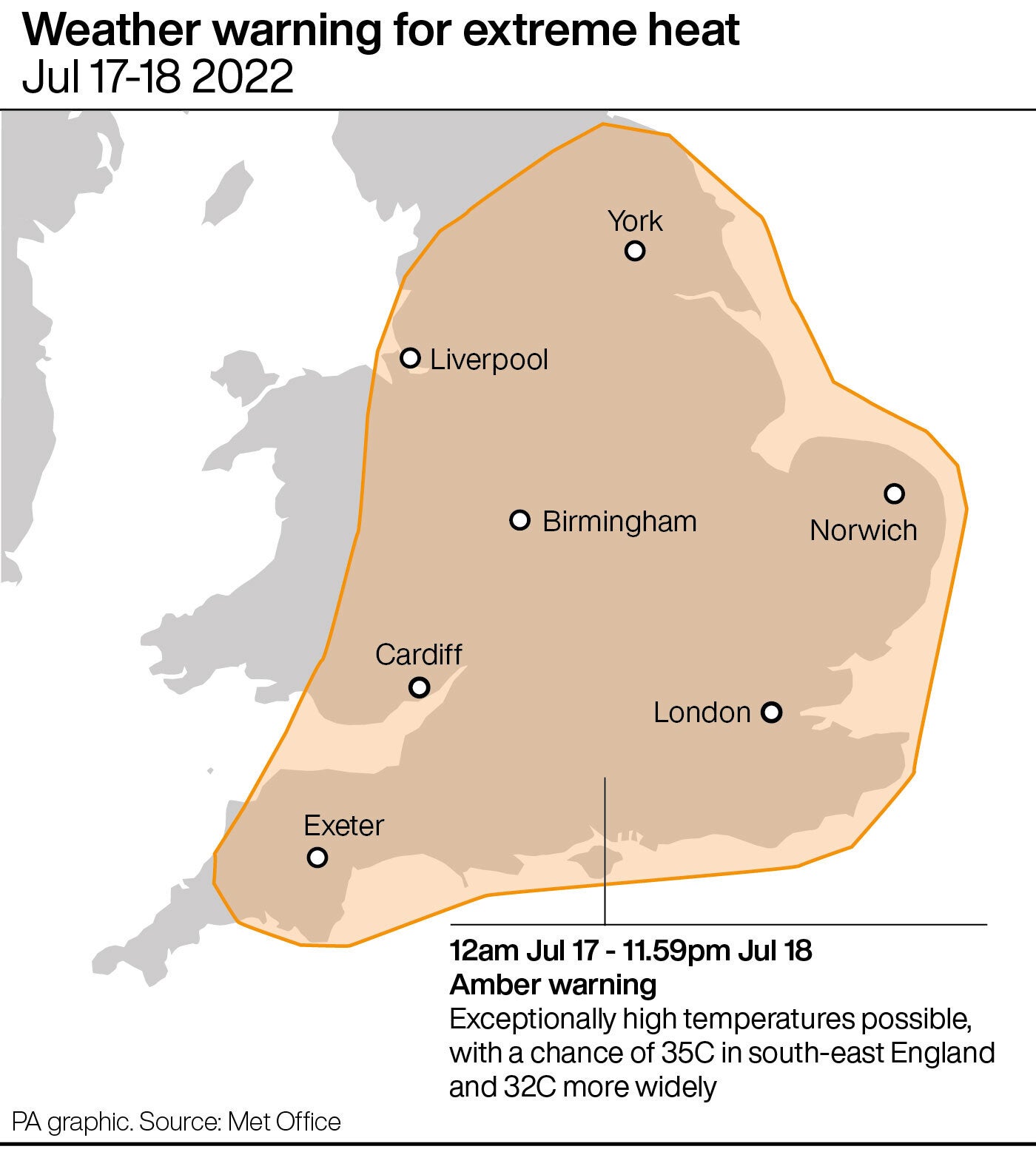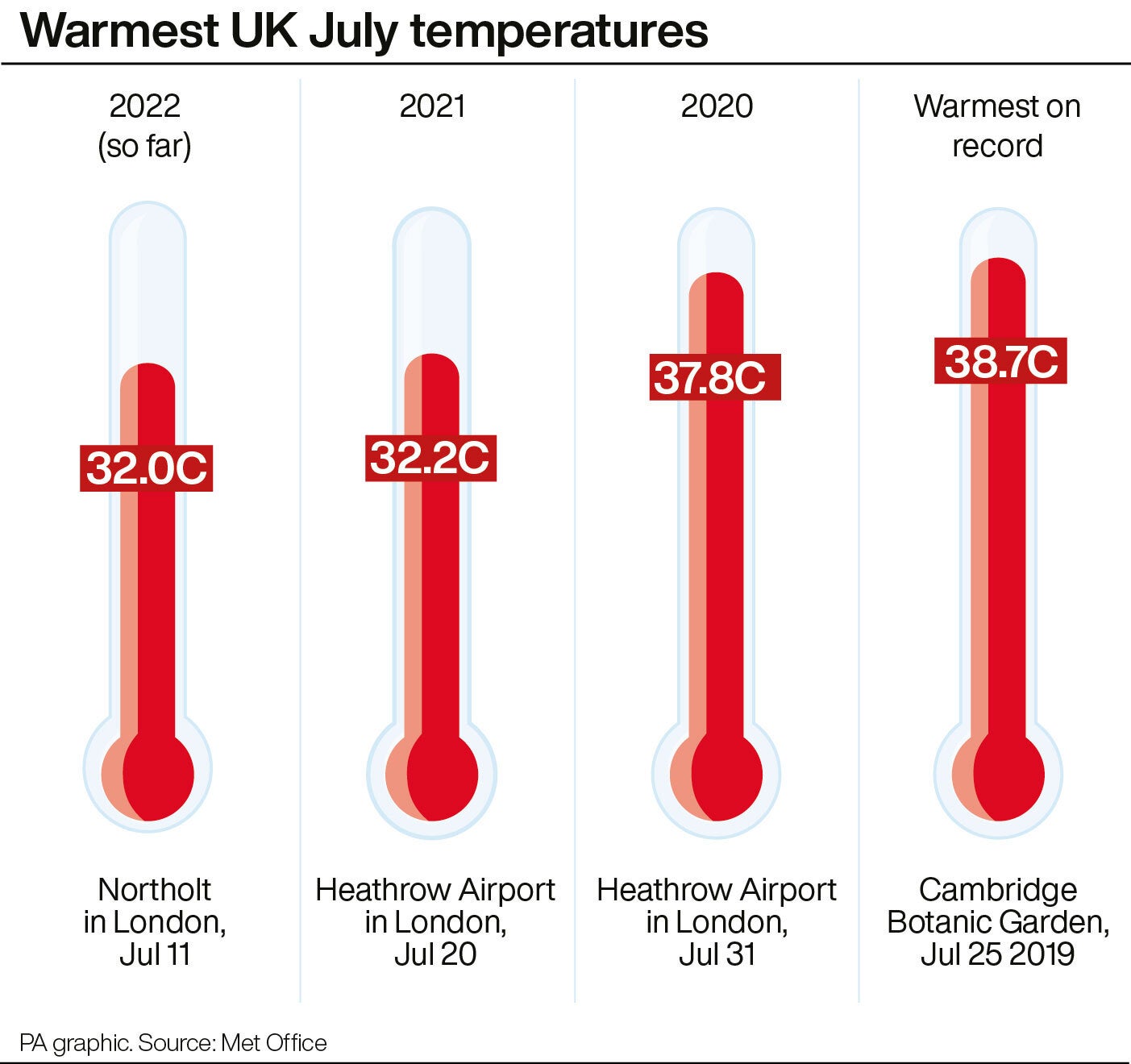
The Met Office has extended its warning for extreme heat across parts of England and Wales into the beginning of next week.
The rare “amber” warning for exceptionally high temperatures, posing a potential risk to life, was first issued to cover Sunday and has now been updated to include the whole of Monday.
Temperatures are predicted to soar into the 30s, with a 30% chance of seeing the hottest day on record for the UK, beating the existing high of 38.7C in Cambridge in 2019.
Scientists warn that current heatwaves have been made hotter, longer and more frequent by climate change.
The UK must adapt to a future of more intense heatwaves, with new homes built to cope with higher temperatures, more green areas in cities, and measures such as external shading and insulation fitted to existing properties, experts said.
Households are being urged to save water as the temperatures push up demand after months of dry weather in some areas.
Water companies say they are are not yet planning to bring in restrictions such as hosepipe bans, but some are warning that groundwater and reservoir supplies are lower than average following low rainfall this year.
Yorkshire Water said its reservoirs were 62% full, down 18% on usual stocks after below-average rainfall in spring and summer, with the dry weather stretching back to last autumn in North Yorkshire.
The water firm said it pumped 200 million litres more water than normal on Monday as the heatwave took hold, an amount equivalent to supplying another city the size of Leeds.
Neil Dewis, director of water, said: “Our region has seen a prolonged dry spell, and while we’ve not had a bumper summer of sunshine and high temperatures, there has been very little rain with just some short, sharp showers that don’t deliver the water we need in our reservoirs and rivers.”

Thames Water said nine out the last 11 months had been drier than average, and groundwater in aquifers, flows in rivers and water in reservoirs were all lower than normal.
A spokesperson said: “We’re not currently expecting to need to introduce restrictions on water use this summer, but we know the water we have stored in our reservoirs will reduce as people start to use more water in their gardens through the summer.
“So if we do not receive around or above average rainfall in the coming months this will increase pressure on our resources and may result in the need for more water saving measures including restrictions.”
Industry body Water UK urged people to turn off taps when brushing their teeth or washing dishes, only run dishwashers when full, switch the garden hose for watering cans, reuse paddling pool water for plants, let the lawn go brown and avoid washing cars.
The Royal Horticultural Society is advising gardeners to avoid watering their gardens in the hottest parts of the day, let lawns grow long without watering them, and install a water butt to capture rainwater from summer showers or storms that would otherwise run off the hard-baked ground.
The Met Office’s amber warning for extreme heat says there could be a danger to life or potential serious illness as a result of the hot days and warm nights.

There could also be road closures, and delays and cancellations to rail and air travel.
Network Rail is preparing to implement speed restrictions in coming days to reduce the likelihood of tracks buckling, and councils are planning to use gritters to spread sand on melting roads.
The Met Office says the mercury is predicted to rise to 30C in some parts of the South East on Tuesday while the rest of England is expected to see temperatures soar to the high 20s.
The whole of England is largely expected to experience sunny days with some cloud over the next week to match the temperatures of mid to high 20s.
It will cool off a little on Thursday and Friday, with the North West and North East of England predicted to have some rain.
Temperatures are expected be over 35C in the South East on Sunday, and overnight temperatures will also be very warm.
Parts of Wales will see temperatures of more than 32C on Sunday and Monday.
Northern Ireland and Scotland – away from far northern areas – will still see warm sunny days, and while temperatures will not be as high as elsewhere, they will reach the high 20Cs, the forecaster said.







